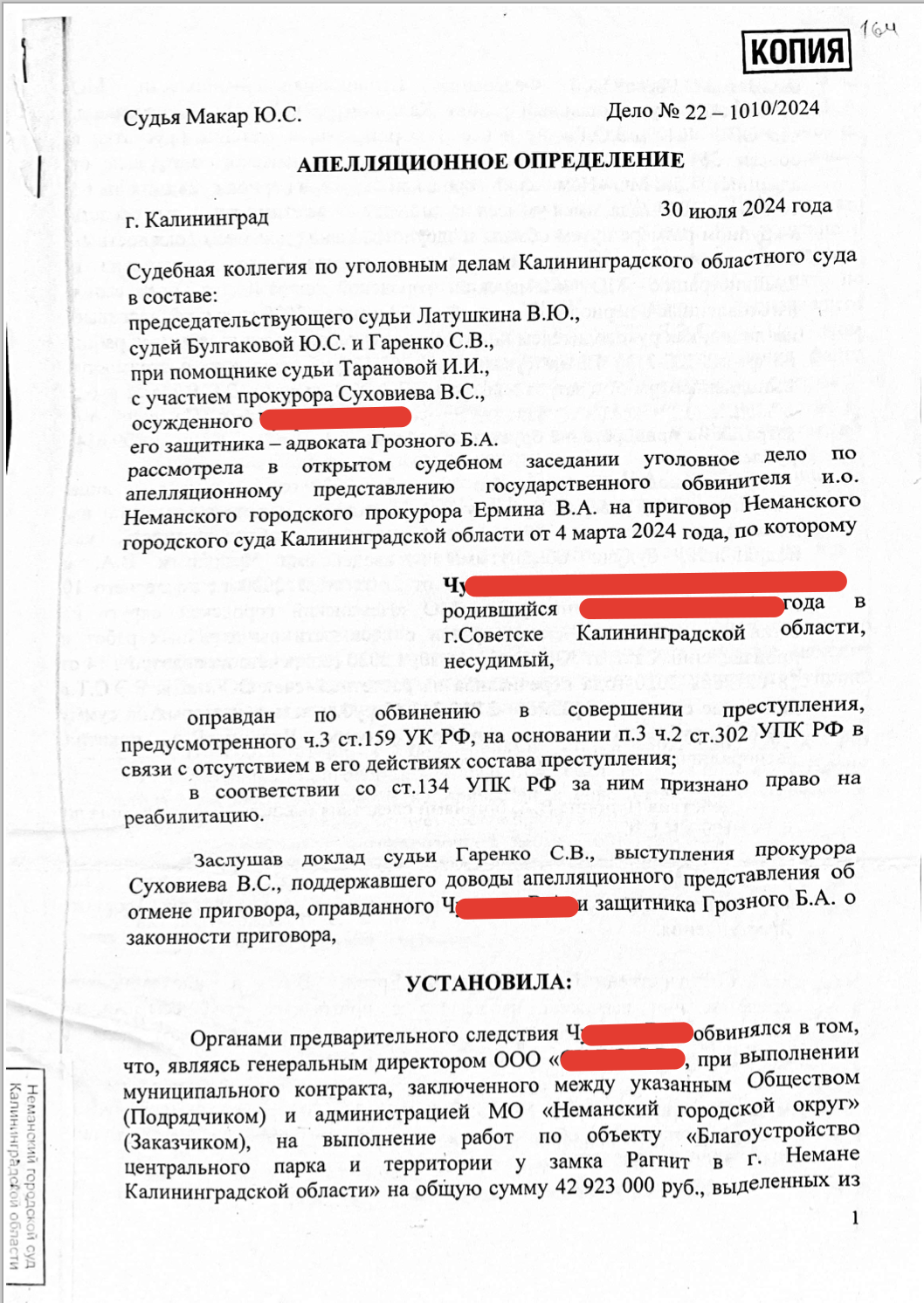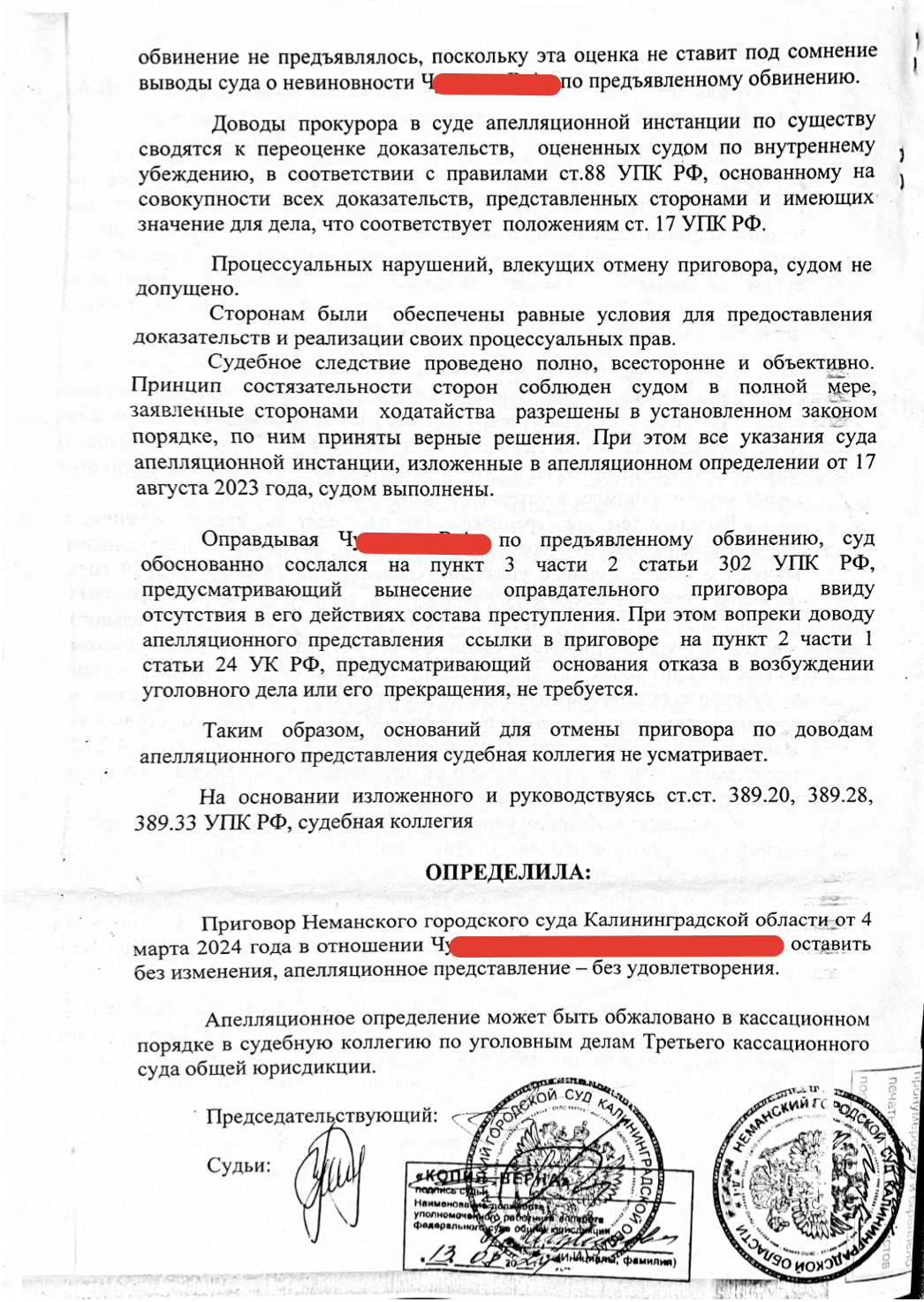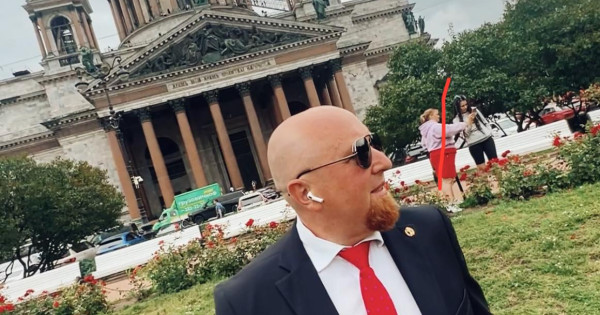The panel of judges upheld the acquittal of our client under Part 3 of Article 159 of the Criminal Code of the Russian Federation (fraud using one's official position, as well as on a large scale). Having recognized our client's right to rehabilitation
The defense was carried out by lawyer Boris Andreevich Grozny and lawyer Alexander Alexandrovich Burmistrov.
The preliminary investigation bodies accused OUR CLIENT of being the general director of LLC "XXX", while fulfilling a municipal contract concluded between the said Company (Contractor) and the administration of the MO "Neman Urban District" (Customer), for the performance of work on the project "Improvement of the central park and the territory near the Ragnit castle in the city of Neman, Kaliningrad Region" for a total of 42,923,000 rubles, allocated from the budgets of the Russian Federation, the Kaliningrad Region, the MO "Neman Municipal District" of the Kaliningrad Region, realizing that LLC "XXX" did not incur costs for the purchase of paving stones in the amount of 361.43 sq.m., received as a customer-supplied material from the administration of the MO "Neman Urban District", in the period from October 28 to November 10, 2020, having the intent to embezzle budget funds on a large scale in the amount of 1,205,308.55 rubles, and a certificate of the cost of work performed and expenses in the form of KS-3 No. 1 in the amount of 2,819,746.55 rubles, including knowingly false information about the costs incurred by the Contractor for the purchase of paving stones in the amount of 361.43 sq.m., in the amount of 899,654 rubles, prepared between August 12 and October 28, 2020 and signed by him personally as the head of the contractor. In the period from October 28 to November 10, 2020, the administration officials, trusting OUR PRINCIPAL by virtue of the authority of the position he occupies, relying on his reliability and good faith as a contractor, being deceived and misled by OUR PRINCIPAL, signed act No. 1.3 dated October 28, 2020, after which, on November 10, 2020, the administration of the MO "Neman Urban District", on the basis of this act, certificate of the cost of work performed and expenses incurred No. 1 dated October 28, 2020, invoice for payment No. 14 dated October 28, 2020, transferred to the bank account of LLC "SK B.E.S.T." monetary funds in the amount of 2,819,746.55 rubles, part of which in the amount of 899,654 rubles, i.e. in a large amount, OUR PRINCIPAL stole, disposing of it at his own discretion.
The actions of OUR PRINCIPAL were classified by the investigative bodies under Part 3 of Article 159 of the Criminal Code of the Russian Federation.
By the court's verdict, OUR PRINCIPAL was acquitted of the charges brought against him due to the absence of corpus delicti in his actions.
In his appeal, State Prosecutor V.A. Ermin expresses disagreement with the court's verdict, citing the discrepancy between the court's findings and the factual circumstances of the case and a material violation of the criminal procedure law.
Indicates that the court repeatedly referred to municipal contract No. 03355200014920001203 in its verdict, whereas OUR CLIENT was charged with embezzlement under contract No. 0335200014920001203.
Discussing the validity of the charge, the court, in paragraph 4 on page 29 of the verdict, assessed the circumstances for which OUR CLIENT was not charged, namely, the latter's performance of work under the contract "not in full", although the state prosecutor made no proposals regarding these circumstances.
Indicating the absence of corpus delicti in OUR CLIENT's actions, the court came to the incorrect conclusion that the decision to offset funds in the amount of RUB 899,654 is due to the initiative of the acquitted person, whereas this decision was made at the request of the customer, represented by the MBUK "Neman", who sent a corresponding notification to the address of OOO "XXX". At the same time, the prosecutor's initiative to conduct an inspection to establish the fact of theft of funds by OUR PRINCIPALS under a municipal contract was unreasonably assessed by the court as premature interference in civil-legal relations between the customer and the contractor before the full completion of obligations under the contract.
Believes that the court, in acquitting OUR CLIENT, unreasonably failed to refer to paragraph 2, part 1, article 24 of the Criminal Procedure Code of the Russian Federation, which provides for acquittal due to the absence of corpus delicti in the act.
Requests that the sentence be overturned and the criminal case sent for a new trial.
Having studied and verified the case materials, the arguments of the appeal, and having heard the opinions of the participants in the process, the court finds no grounds for overturning the acquittal of OUR CLIENT based on the arguments of the appeal.
In accordance with the requirements of Articles 302 and 305 of the Criminal Procedure Code of the Russian Federation, an acquittal is issued if the event of a crime has not been established, the defendant is not involved in the commission of a crime, and there is no corpus delicti in the defendant's act.
The descriptive and reasoning part of the acquittal verdict sets out the essence of the charges brought, the circumstances established by the court, the grounds for acquitting the defendant and the evidence supporting them, and the reasons why the court rejected the evidence presented by the prosecution.
In this case, these legal requirements have been fully met. The verdict contains all the evidence presented by the parties and relevant for establishing legally significant circumstances; they have been analyzed, verified, and assessed by the court in accordance with the requirements of Art. 88 of the Criminal Procedure Code of the Russian Federation.
In acquitting OUR CLIENT, the court agreed with this position, concluding that his actions did not constitute a crime under Part 3 of Art. 159 of the Criminal Code of the Russian Federation.
The panel of judges did not see any grounds to disagree with this conclusion.
The subjective side of the crime under Art. 159 of the Criminal Code of the Russian Federation is characterized by direct intent, that is, when committing this crime, a person must be aware that his actions are socially dangerous, cause property damage to the owner, foresee dangerous consequences in the form of causing harm and have the goal of converting the seized property to his own benefit or to other persons.
Thus, criminal liability occurs only if the intent to steal by deception or abuse of trust is proven.
Theft, including fraud, according to paragraph 1 of the notes to Article 158 of the Criminal Code of the Russian Federation, is understood as the unlawful gratuitous seizure and (or) conversion of someone else's property for the benefit of the guilty party or other persons committed with a mercenary purpose, causing damage to the owner or other holder of this property.
According to the meaning of Article 159 of the Criminal Code of the Russian Federation and in accordance with the explanations contained in paragraphs 1-3 of the Resolution of the Plenum of the Supreme Court of the Russian Federation dated November 30, 2017 N 48 "On judicial practice in cases of fraud, misappropriation and embezzlement", the methods of theft in fraud are deception or abuse of trust, under the influence of which the owner of the property or another person transfers the property or the right to it to another person or does not prevent the seizure of this property or the acquisition of the right to it by another person.
Deception may consist in the deliberate communication (representation) of knowingly false information that does not correspond to reality, or in concealment of true facts, or in deliberate actions aimed at misleading the owner of the property or another person.
Abuse of trust in fraud consists in the use of trusting relationships with the owner of the property or another person authorized to make decisions on the transfer of this property to third parties for selfish purposes. Trust may be based on various circumstances, such as the official position of a person or his personal relationship with the victim.
However, no such circumstances have been established in this case.
Taking into account the provisions of Article 14 of the Criminal Procedure Code of the Russian Federation, according to which a guilty verdict cannot be based on assumptions, and all doubts that cannot be eliminated are interpreted in favor of the accused, the court came to a reasonable conclusion about the need to acquit OUR CLIENT.
The argument of the appellate motion regarding the court's assessment of the circumstances under which the charge was not brought cannot entail the cancellation of the acquittal verdict, since this assessment does not call into question the court's conclusions about the innocence of OUR CLIENT on the charge brought.
The prosecutor's arguments in the appellate court essentially boil down to a re-evaluation of the evidence assessed by the court based on its inner conviction, in accordance with the rules of Article 88 of the Criminal Procedure Code of the Russian Federation, based on the totality of all evidence presented by the parties and relevant to the case, which corresponds to the provisions of Article 17 of the Code of Criminal Procedure of the Russian Federation.
The court did not commit any procedural violations that would lead to the reversal of the sentence.
The parties were provided with equal conditions for presenting evidence and exercising their procedural rights.
The judicial investigation was conducted fully, comprehensively and objectively. The principle of adversarial proceedings was fully observed by the court, the motions filed by the parties were resolved in accordance with the procedure established by law, and the correct decisions were made on them. At the same time, all instructions of the court of appeal, set out in the appellate.




